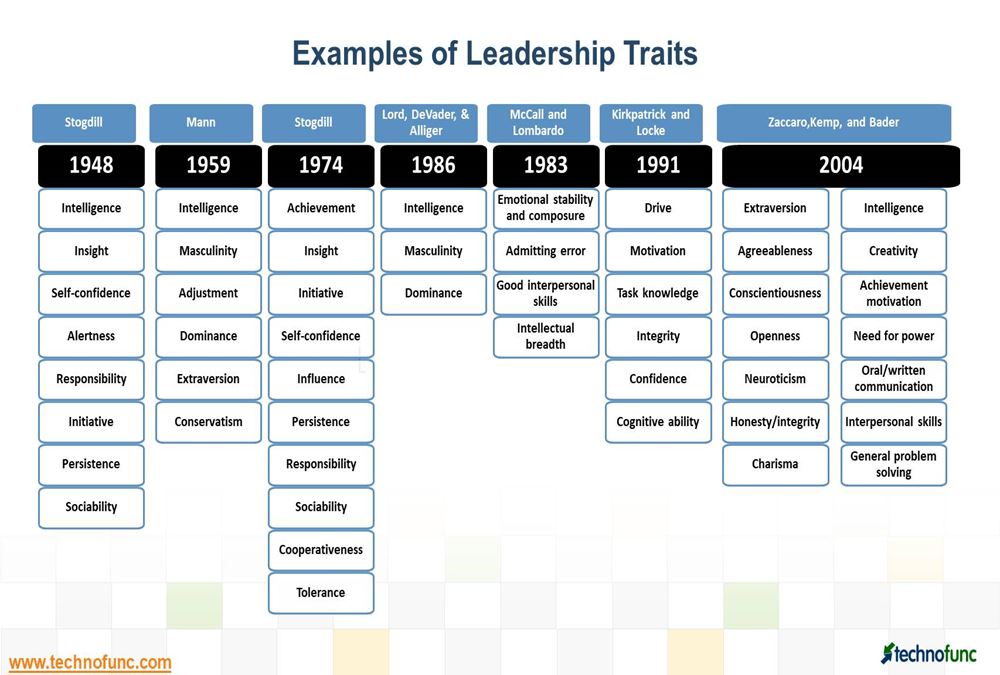- Home
- Business Processes
- Industry Knowledge
- Aerospace Industry
- Automotive Industry
- Banking Domain
- BFSI Industry
- Consumer/ FMCG Industry
- Chemicals Industry
- Engineering & Construction
- Energy Industry
- Education Domain
- Finance Domain
- Hospitality Domain
- Healthcare Industry
- Insurance Domain
- Retail Industry
- Travel and Tourism Domain
- Telecom Industry
- Leadership Skills
- eLearning
- Home
- Leadership
- Leadership Theories
- Leadership Traits – A great List
Leadership Traits – A great List
What are the qualities and characteristics of a good leader? Great leaders possess core leadership traits and skills. The list includes the most important leadership qualities and skills to look for in a great leader. These are must-have traits of a powerful and successful leader, the qualities a leader possess to be great.
A broad classification to six categories of traits is also done below:
Physical Characteristics of the Leader:
- Age
- Height
- Weight
- Alertness
- Energetic
- Masculinity
- High energy level
- Physical stamina
- Tolerance for stress
- Not concerned about being overworked
- Vitality
Background Characteristics of the Leader:
- Education
- Social Status
- Mobility
- Experience
- Experience in a variety of different types of situations
- Broader perspective
- Expertise in dealing with different types of problems
- Competent and skilled
Intelligence Characteristics of the Leader:
- Ability
- Judgment
- Knowledge
- Clever (intelligent)
- Conceptually skilled
- Creative
- Knowledgeable about group task
- Intellectual breadth
- Insight
- Learns from experience
- Adapts to change
- Good judgment
- Foresight
- Intuition
- Creativity
- Self-knowledge
- Coordinator
- Objective
- Decisive
- Asks for more responsibility
- Knows how to delegate
Personality/Emotional Characteristics of the Leader:
- Aggressiveness
- Alertness
- Dominance
- Decisiveness
- Enthusiasm
- Extroversion
- Independence
- Self-confidence
- Authoritarianism
- Assertive
- Tolerant of stress
- Conservatism
- Desire to improve
- Understands own strengths and weaknesses
- Self-objectivity
- Emotional intelligence
- Self-awareness
- Empathy
- Self-regulation
- Ambitious
- Courageous
- Knows self
- Risk taker
- Not intimidated by superiors
- Personal competence
- Optimistic
- Exhibits concern for others
- Encourages and engages opposing viewpoints
- Constant and reliable
- Self-disciplined
- Determination
- Need to achieve
- Caring
- Empathizing
- Constancy
Task-Oriented Characteristics of the Leader:
- Achievement Needs
- Responsibility
- Initiative
- Persistence
- Ambitiousness
- Achievement-orientated
- Decisive
- Persistent
- Willingness to assume responsibility
- Organized (administrative ability)
Social Characteristics of the Leader:
- Sociability
- Supervisory Ability
- Cooperativeness
- Popularity
- Prestige
- Tact
- Diplomacy
- Adaptability
- Adjustment
- Cooperative
- Dependable
- Tactful
- Persuasive
- Socially skilled
- Emotional stability and composure
- Good interpersonal skills
- Well-adjusted
- Oriented toward improving self
- Detached
- Honest
- Ethical
- Trustworthy
- Behavioral flexibility
- Understanding
- Empathy
- Social Insight
- Charm
- Tact
- Diplomacy
- Persuasiveness
- Listener
- Collaborative
- Strong motivator
- Cooperative
- Influencer
Communication:
- Ability to communicate
- Ability to articulate a vision
- Ability to persuade others
- Communicate purpose
- Communicate direction
- Communicates passion to others
- Good communication skills
- Use metaphors
- Experts at one-to-one communication
- Superior speakers
- Excellent writing skills
- Creates and maintains a communications network
- Has people keep them informed on problem situations
- Networks with people inside the organization
- Maintains contacts outside the organization
- Doesn’t depend on only one source for information
- Able to communicate with key individuals
- Eager to explore new approaches to their work
- Are not fuzzy about results, interested in ways to track their progress
- Communicates persuasively

Related Links
You May Also Like
-
Humanistic theories of Leadership
Humanistic leadership is an ethical philosophic approach that recognizes the dignity and worth of each and every group or team member. This approach is based on building a leadership culture of trust, ethics, and empathy. Humanistic leadership is a set of principles founded on humanism with vision, mission, values, and expected behaviors. It is value-driven leadership based on principles such as humility, accountability, positivity, and love.
-
Management theories are the recommended management strategies that enable us to better understand and approach management. Many management frameworks and guidelines were developed during the last four decades.
-
Burns Transformational Leadership Theory
Transformational leadership theory has been defined by James MacGregor Burns as a process where both leaders and followers mutually raise one another to higher levels of morality and motivation. The concept of transforming leader works with teams to garner trust, respect, and admiration while reaching to higher moral positions. The transformational theory of leadership was developed while studying political leaders and how they use charismatic methods to attract people to the values.
-
The style approach emphasizes that one style of leadership behaviour cannot be effective in all situations. Earlier theories treated leadership exclusively as a personality trait and behavior approach has widened the scope by including the behaviors of leaders and what they do in various situations. Explore how you can benefit from the concepts to understand your own behaviors and what are some of the leadership tools based on the style approach to leadership.
-
Situational Leadership - Application
Situational Leadership Theories are well known and frequently used for training leaders within organizations. Practical application is how to choose the right leadership approach for the situation. The theory emphasizes leader flexibility and advises leaders to flex their style based on the followers' needs. Leaders must adapt their leadership style to fit the prescribed task, understanding given situation/maturity of followers.
-
The social identity theory of leadership views leadership as a group process. Social identity is a person's sense of who they are based on their group membership. Social identity theory sets agendas and goals generated by social categorization, defines who we are based on processes associated with social identity, and motivates to conduct ourselves based on what followers think of the leader.
-
Team leadership theory is a recent leadership theory that does not discriminate between the leader and the other team members. The approach considers contributions from each team member to be critical for organizational success. This approach focused on the overall team effectiveness and team problems are diagnosed and action is taken to remediate weakness. This approach provides for taking corrective action when the leader deems necessary.
-
Continuum of leadership is a leadership theory based on the relationship between the level of freedom given to the team and the level of authority used by the manager. The chosen leadership style will depend on multiple factors, including the leader's personality.
-
In emergent leadership, the leader is not appointed or elected to the leadership role but emerges as the leader as he is perceived by others over time as a result of the group's interaction. A person steps up as the leader over time by taking on tasks voluntarily, helping others complete their tasks better, and building consensus among groups.
-
Michigan Leadership Studies led to behavioral Leadership Theory as a result of a leadership study conducted at the University of Michigan. Michigan studies identified three important behaviors of leadership called task-oriented behavior, relationship-oriented behavior, and participative leadership. Two leadership styles associated with studies are employee orientation and production orientation.
Explore Our Free Training Articles or
Sign Up to Start With Our eLearning Courses

About Us
Learning
© 2023 TechnoFunc, All Rights Reserved










